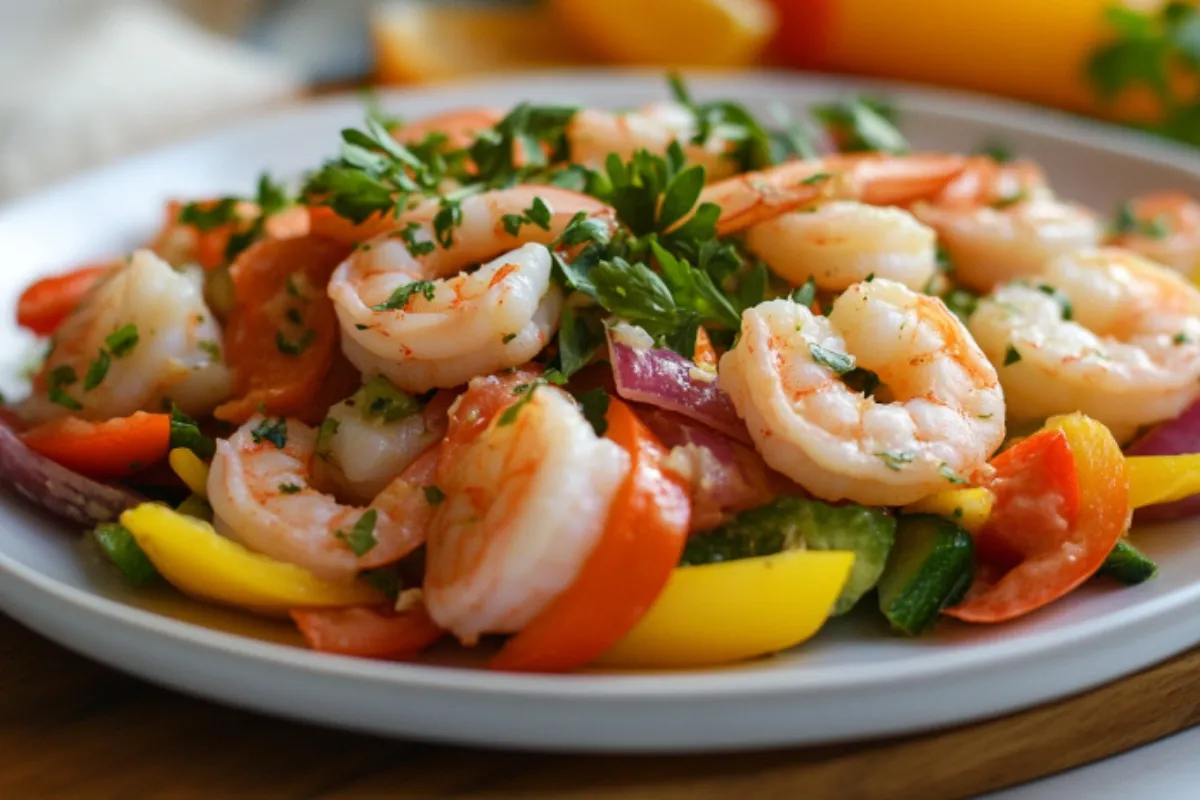Why Meal Prep Is a Smart Approach to Eating Healthy
Healthy Meal Prep Ideas are a fantastic way to maintain a nutritious and balanced diet without spending hours cooking every day. With busy schedules, it’s easy to fall into the trap of unhealthy eating, but having a plan for your meals can make a huge difference. Whether you’re trying to lose weight, build muscle, or just want to eat healthier, healthy meal prep ideas help streamline the process and ensure you’re making nourishing choices throughout the week.
Why Meal Prep Is a Smart Approach to Eating Healthy
One of the biggest challenges people face when it comes to eating healthy is lack of time. Healthy meal prep ideas solve this problem by allowing you to prepare meals in advance, so you’re not scrambling to figure out what to eat during the week. Prepping your meals in bulk also saves you money and reduces food waste, making it an efficient and eco-friendly choice.
Additionally, when you have meals prepped and ready to go, you’re less likely to reach for fast food or unhealthy snacks, which can derail your nutritional goals. By incorporating healthy meal prep ideas into your routine, you create a system that supports your long-term health and wellness.
Who Benefits from Healthy Meal Prep?
While meal prepping might seem like a time-consuming task, the truth is that it benefits just about everyone. If you’re working long hours, juggling multiple responsibilities, or simply find it difficult to maintain a balanced diet, healthy meal prep ideas are a game-changer. Meal prepping can save you time and help you avoid stress around meal decisions.
Meal Planning for Busy Lifestyles
For those with packed schedules, healthy meal prep ideas allow you to make nourishing meals ahead of time, so you’re not stuck in the kitchen after a long day. This is especially helpful for families, busy professionals, or students who may not have the time to cook every day. With meal prep, you can spend less time thinking about what to eat and more time focusing on other important things in your life.
Time and Stress Reduction Through Meal Prepping
Another great thing about healthy meal prep ideas is that they drastically reduce stress. You won’t have to worry about what to cook each night or get tempted to grab unhealthy takeout. Instead, you’ll have ready-to-go meals that simply need to be heated up, giving you more time to relax and enjoy your day.
Understanding the Basics of Meal Prep
To get started with meal prepping, it’s essential to understand the basics. Healthy meal prep ideas typically involve planning and preparing meals for a set period of time (usually 3-7 days), making sure they include all the necessary nutrients to keep you energized and satisfied.
Meal prepping doesn’t need to be complicated; it’s about finding a system that works for your lifestyle. Whether you’re preparing simple meals or more complex dishes, healthy meal prep ideas give you the flexibility to eat what you love while maintaining a healthy balance.
Common Misconceptions About Meal Prep
Many people think that healthy meal prep ideas require hours of cooking or that they’ll have to eat the same meal every day. In reality, meal prepping can be quick and easy, and you can switch up your meals so you don’t get bored. The key is to focus on a variety of ingredients and recipes to keep your meals exciting and nutrient-dense.
What Makes a Healthy Meal Prep?
So, what makes healthy meal prep ideas different from just regular meal planning? The key is balance. A healthy meal prep includes a variety of macronutrients (protein, carbs, and fats) along with plenty of micronutrients (vitamins and minerals). This ensures that your meals provide all the nutrients you need to stay healthy and satisfied.
Key Components of a Balanced Meal Prep
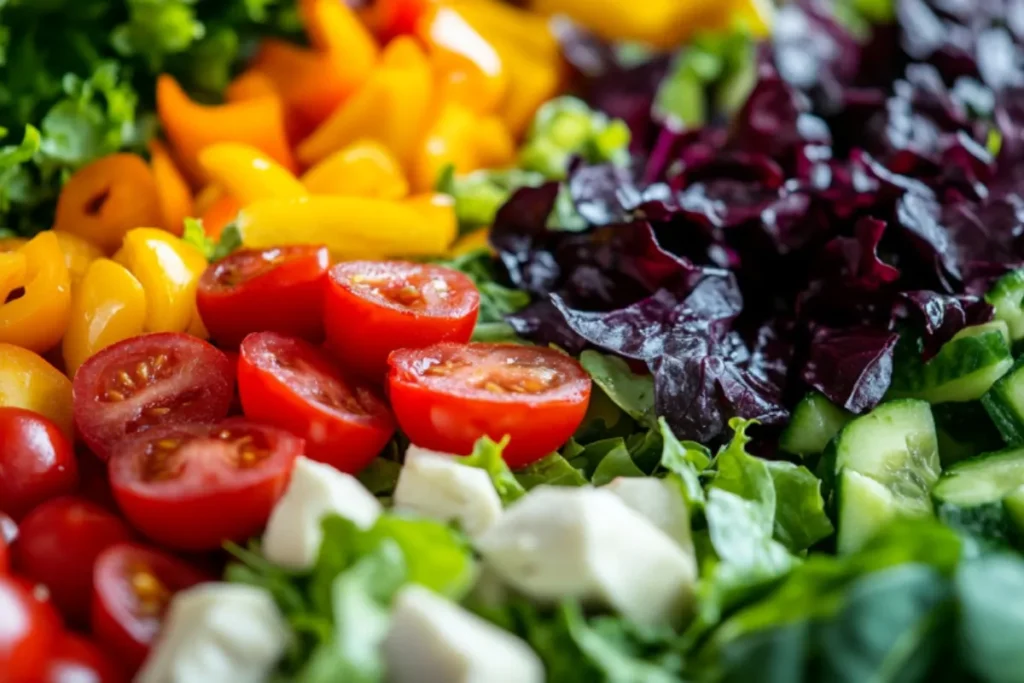
A well-rounded meal prep plan should include protein, carbohydrates, and fats. These macronutrients are the building blocks of a healthy diet. By including a variety of these nutrients, you can ensure your meals are balanced and satisfying.
- Protein helps with muscle repair and keeps you feeling full.
- Carbs provide energy, especially if you’re active.
- Healthy fats are essential for brain function and heart health.
Macronutrients – Protein, Carbs, and Fats
For optimal healthy meal prep ideas, focus on lean protein sources like chicken, tofu, or beans. Combine these with complex carbs like quinoa, brown rice, and sweet potatoes for sustained energy. Add healthy fats like avocado, olive oil, or nuts to round out the meal.
Micronutrients – Vitamins and Minerals in Meal Prep
Don’t forget about micronutrients! Include plenty of colorful vegetables like spinach, broccoli, peppers, and carrots in your healthy meal prep ideas. These foods are rich in vitamins and minerals that support your immune system, skin health, and overall well-being.
Common Meal Prep Mistakes to Avoid
Even with the best healthy meal prep ideas, there are common mistakes people often make. Here are a few to watch out for:
Overlooking Portion Control
One of the most significant mistakes in meal prepping is overestimating portion sizes. Healthy meal prep ideas are about balancing nutrients and controlling portions. If you make your portions too large, you might end up overeating, even if the meals are healthy.
Skipping Variety in Ingredients
Another mistake is repeating the same meals every day. While healthy meal prep ideas can be convenient, variety is essential to keep things exciting and ensure you’re getting all the nutrients you need. Switch up your veggies, grains, and protein sources to add variety to your meals.
One way to keep your meal prep exciting and fresh is by incorporating a variety of proteins and vegetables. For example, consider making a shrimp salad as part of your meal prep for a light and flavorful option. Not only will this add diversity to your meals, but shrimp is also a great source of lean protein, which is perfect for a healthy lunch! For more ideas, check out our post on shrimp salad recipes
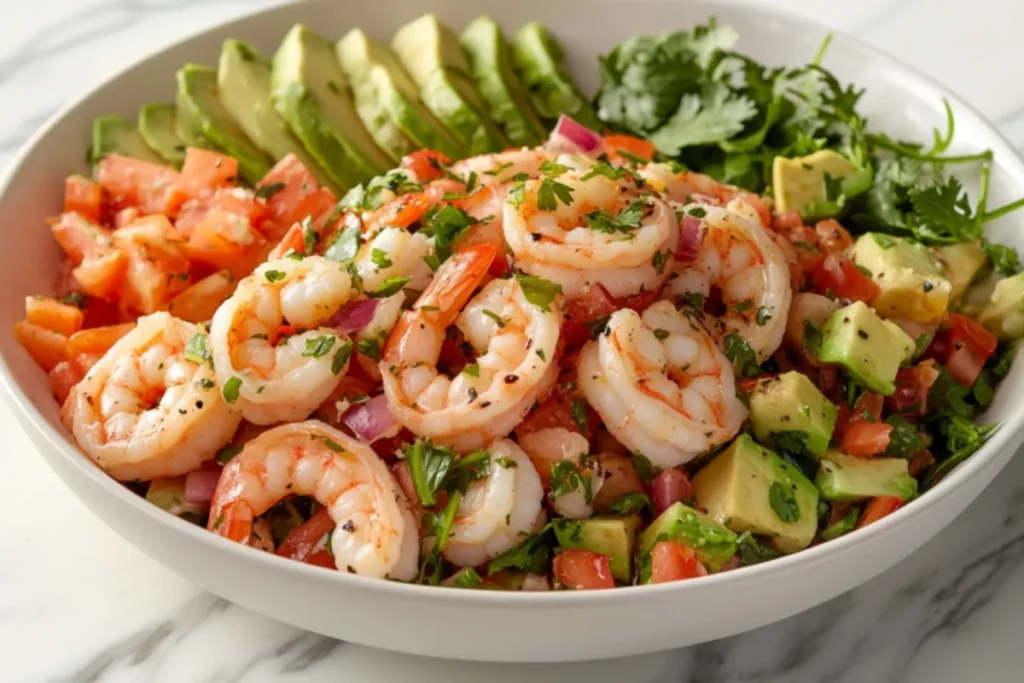
Benefits of Healthy Meal Prep
There are several benefits to adopting healthy meal prep ideas into your routine, from health benefits to financial savings.
Improved Health and Weight Management
When you prepare your meals in advance, you’re in control of what goes into them. This allows you to focus on balanced meals that promote weight loss, muscle gain, or simply better nutrition. It’s easier to manage portion sizes, and you’ll avoid the temptation of fast food or unhealthy snacks.
Cost Savings and Reduced Waste
Meal prepping also saves money. By purchasing ingredients in bulk and planning your meals, you’ll avoid ordering takeout or buying expensive pre-packaged foods. Additionally, healthy meal prep ideas help reduce food waste since you’re only making what you need for the week.
Is Meal Prepping Actually Healthy?
Some people question whether meal prepping is truly healthy, especially when it comes to freshness and nutrient loss.
Addressing Concerns Around Freshness and Nutrient Loss
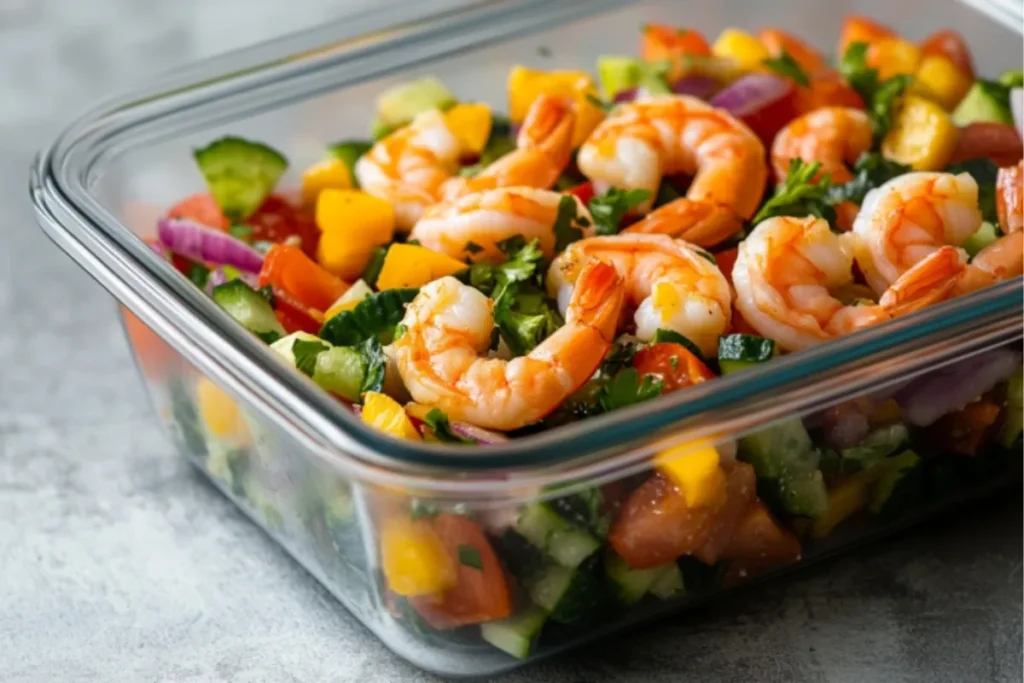
It’s true that food loses some nutrients over time, but when done correctly, healthy meal prep ideas can still be incredibly nutritious. Storing meals in airtight containers in the fridge or freezer will help retain freshness and prevent nutrient loss. If you’re concerned about nutrient loss, there are strategies that may help. You can learn about how to maximize nutrients when cooking.
It’s true that food loses some nutrients over time, but when done correctly, healthy meal prep ideas can still be incredibly nutritious. Storing meals in airtight containers in the fridge or freezer will help retain freshness and prevent nutrient loss. Additionally, certain foods, like grains and roasted veggies, actually store better and taste great when reheated!
The Truth About Long-Term Meal Prepping
Long-term meal prepping (for 5-7 days) is perfectly safe as long as you store your meals properly. Make sure you’re using airtight containers and refrigerating or freezing meals immediately after prepping. This ensures that your healthy meal prep ideas stay fresh and delicious throughout the week.
Healthy Meal Prep Ideas for Every Lifestyle
Best Meal Prep Tips for Beginners
Starting with meal prep can feel a little overwhelming, but once you get the hang of it, it’ll become second nature. If you’re new to meal prepping, the first step is setting yourself up for success by following a few simple tips. These will help you stay organized, save time, and make the process much smoother.
How to Choose Healthy Recipes for Meal Prep
When you’re picking recipes for meal prep, the key is choosing ones that are not only nutritious but also easy to prepare in bulk. Here’s how you can choose the best ones for your needs:
Focus on Whole Foods and Lean Proteins
One of the best choices for meal prep is focusing on whole foods. You want to keep things as fresh and unprocessed as possible, so opt for fruits, vegetables, whole grains, and lean proteins. Chicken breast, turkey, fish, and plant-based proteins like tofu or tempeh are great options. These foods are nutrient-dense and easy to incorporate into various recipes.
Moreover, you’ll want to incorporate a variety of protein sources to keep things interesting. For example, you could try grilling chicken one week and roasting salmon the next. Adding in plant-based proteins or beans will give you even more variety, ensuring your meals never get boring.
Easy-to-Prepare Meals for Busy Weekdays
When you’re meal prepping, it’s also important to consider how much time you’ll need to spend in the kitchen during the week. The goal is to create meals that are both easy to prepare and simple to reheat. You don’t want to spend hours every night in front of the stove. That’s why recipes that only need minimal cooking or require little prep time are ideal.
For example, consider making a simple stir-fry with pre-chopped vegetables, or try overnight oats that require no cooking at all. Slow-cooked meals like soups and stews are also perfect for meal prep because they can be made in big batches and easily reheated.
Meal Prep Ideas for Weight Loss
Meal prepping can be a game-changer when it comes to losing weight. By planning your meals in advance, you can make healthier choices and stay on track with your goals. Plus, knowing exactly what you’re eating helps prevent the temptation of last-minute junk food cravings.
Low-Calorie, High-Protein Options
If weight loss is your goal, choosing meals that are high in protein and low in calories is a great strategy. Protein helps you feel full longer, making it easier to avoid overeating. Some excellent low-calorie, high-protein options include grilled chicken breast, turkey, eggs, or even protein-packed legumes like lentils and chickpeas.
Consider preparing meals like:
- Grilled chicken salad with mixed greens – Toss with a light vinaigrette dressing.
- Turkey and veggie stir-fry – Use zucchini, bell peppers, and mushrooms for a low-calorie, nutrient-rich meal.
These meals are filling, flavorful, and won’t break your calorie bank. Plus, they’re super simple to make in bulk.
Recipes That Boost Metabolism
Metabolism-boosting foods are also excellent to incorporate into your meal prep routine. Foods like green tea, chili peppers, and high-fiber grains can give your metabolism a little extra kick, helping you burn calories more efficiently throughout the day.
Try preparing meals with metabolism-boosting ingredients such as:
- Chili with black beans and lean ground beef or turkey – The spice from chili peppers and the fiber from beans can rev up your metabolism.
- Quinoa and roasted vegetables with a lemon-tahini dressing – Quinoa is a high-fiber grain that supports digestion and helps keep you full longer.
These meals provide the nutrition your body needs while giving your metabolism a boost—making weight loss that much easier.
Meal Prep for Different Diets
Whether you follow a specific diet plan or just want to make sure your meals align with certain preferences, meal prepping can be easily tailored to fit various eating styles.
Vegan and Vegetarian Meal Prep Ideas
For those on a plant-based diet, meal prepping can be a breeze, as there are so many delicious vegan and vegetarian options to choose from. Beans, tofu, tempeh, and quinoa are great sources of plant-based protein, and they pair beautifully with an array of vegetables.
Try making meals like:
- Lentil stew – Packed with protein and fiber, it’s a filling, nutritious option that stores well.
- Tofu stir-fry with vegetables – Use tofu as your protein source, and stir-fry it with a mix of your favorite vegetables.
Incorporating a variety of colorful veggies, grains, and legumes into your meals ensures that you’re getting a broad spectrum of nutrients.
Gluten-Free Meal Prep Solutions
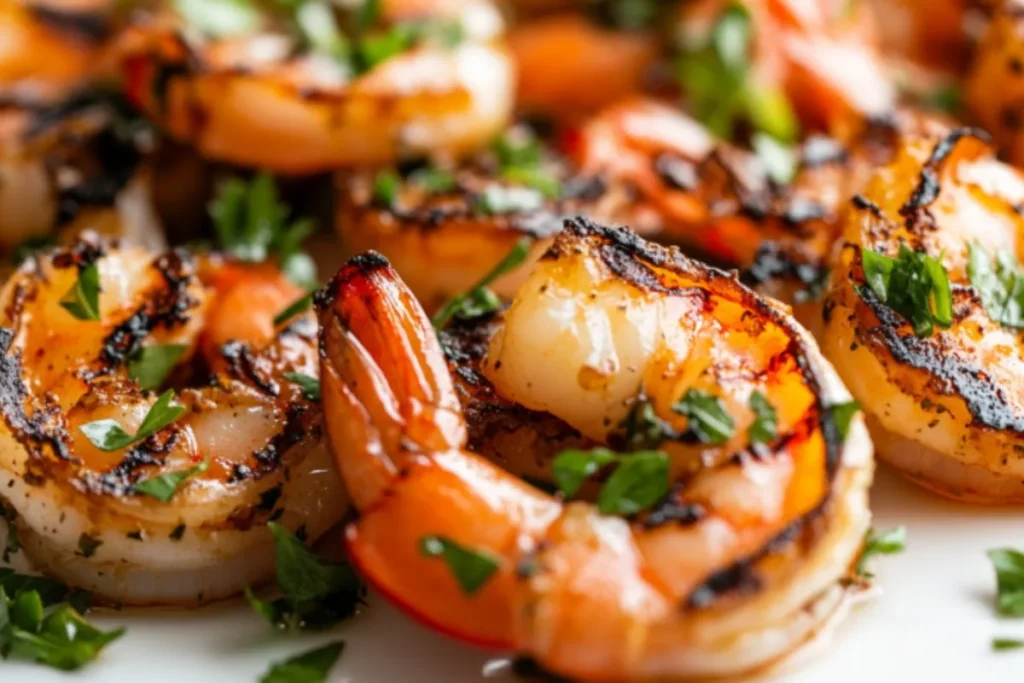
For those with gluten sensitivities or following a gluten-free diet, meal prep can also be a great way to stay on track. There are plenty of naturally gluten-free foods, including rice, quinoa, potatoes, and most meats and vegetables. Just be sure to check the labels of processed foods for hidden gluten!
Some ideas for gluten-free meal prep include:
- Quinoa bowls with roasted veggies and chicken – Quinoa is a naturally gluten-free grain and makes for a perfect base for meal bowls.
- Sweet potato and black bean salad – Full of fiber and nutrients, it’s a satisfying and easy-to-make meal.
As long as you focus on whole foods and avoid processed gluten-containing items, you’ll have no trouble creating gluten-free meal prep options.
How Many Days Should You Meal Prep For?
When you’re starting your meal prep journey, one of the biggest questions is, “How many days should I meal prep for?” The answer depends on a few factors, like how much time you have to cook, how long your meals stay fresh, and your individual schedule.
5-Day Meal Prep vs. 7-Day Meal Prep: Which Is Better?
The debate between prepping meals for five days versus seven days often comes down to personal preference. For the most part, prepping for five days is ideal for most people. This allows you to prepare fresh meals without worrying about them losing their flavor or texture.
However, some people prefer to prep meals for the entire week, especially if they are super busy or want to save more time during the week. If you choose this route, freezing a portion of your meals can help keep them fresh longer. For example, you might prep all seven days’ worth of lunches, but freeze half to avoid eating food that’s been sitting in the fridge for too long.
The Ideal Meal Prep Duration for Freshness and Flavor
If you’re new to meal prep, it’s usually best to aim for a 3-5 day window. This gives you enough time to enjoy fresh, flavorful meals without worrying too much about spoilage. Some ingredients, like leafy greens, may only stay fresh for a few days, while grains and proteins like chicken or beef can hold up longer when properly stored.
Final Thoughts on Healthy Meal Prep
Meal prepping is an amazing tool for those looking to eat healthier, save time, and stay on top of their nutrition goals. By choosing the right ingredients, creating balanced meals, and planning ahead, you can make sure you’re nourishing your body with the foods it needs to thrive.
Long-Term Benefits of Consistent Meal Prepping
The long-term benefits of meal prepping go beyond just saving time and money. By making it a habit, you can create a sustainable lifestyle that supports your health and wellness goals. Not only will meal prepping help you stay on track with healthy eating, but it can also help reduce stress around meal planning and eliminate the need for last-minute unhealthy food choices.
How to Stay Motivated with Meal Prep
Staying motivated with meal prep can be tricky at times, but setting realistic goals and keeping things interesting can help. Experiment with new recipes, involve the whole family in the process, or even try meal prepping with a friend. The more fun you make it, the easier it will be to stick with.
Resources and Tools to Get Started with Meal Prep
To make meal prep even easier, there are a ton of helpful resources out there, from meal prep planners to apps that help you create grocery lists and track nutrition. Additionally, investing in good containers that are microwave-safe and airtight can make a big difference in keeping your meals fresh and ready to go.
FAQs
What Is the Healthiest Meal for Prep?
The healthiest meal for prep is one that incorporates a variety of nutrient-dense whole foods, including lean proteins, healthy fats, and a colorful array of vegetables. For example, a grilled chicken breast with quinoa and roasted vegetables is a perfect choice. Not only is it packed with lean protein, but it also includes complex carbs from quinoa and vitamins from the veggies. Similarly, a tofu stir-fry with mixed vegetables is an excellent vegan option that provides a great balance of protein, fiber, and vitamins.
When prepping meals, always aim to include multiple food groups to ensure you’re getting all the essential nutrients your body needs. Focus on whole, unprocessed foods and avoid added sugars or unnecessary fats to keep your meals as healthy as possible.
Is Meal Prepping Actually Healthy?
Yes, meal prepping can absolutely be healthy when done properly. By taking the time to plan and prepare meals in advance, you’re able to control the ingredients, portion sizes, and nutritional content of each meal. This makes it easier to avoid unhealthy processed foods and make better choices, especially if you’re trying to lose weight or maintain a balanced diet.
However, some people may worry about the freshness of meal prepped food or the potential loss of nutrients over time. To keep meals as fresh as possible, store them in airtight containers and refrigerate or freeze portions you don’t plan to eat within the first few days. If you’re concerned about nutrient loss, try to eat your meal prep within 3-5 days to ensure you’re getting the most out of your ingredients.
Is It Better to Meal Prep for 5 or 7 Days?
When deciding whether to meal prep for 5 or 7 days, it ultimately depends on your lifestyle and how much time you want to spend in the kitchen. For most people, prepping for 5 days is usually the sweet spot, as it ensures you can eat fresh, flavorful meals without worrying about them getting soggy or losing their taste.
If you prefer to prep for the entire week, it’s a good idea to freeze a portion of your meals, especially if you’re making meals that need to stay fresh longer. That way, you can enjoy fresh meals for the first few days and save the frozen meals for later in the week when you’re in need of something quick.
What Should I Avoid When Meal Prepping?
While meal prepping is a great way to eat healthier, there are a few common mistakes you should avoid:
- Over-complicating recipes: Try to keep things simple and easy to prep. Choose meals with ingredients that don’t require a lot of cooking time or special equipment. This makes it easier to stick to your meal prep routine.
- Skipping portion control: It’s important to measure your portions to avoid overeating. Meal prep isn’t just about making food ahead of time—it’s about making balanced meals. Use containers that help you control your portions and prevent overeating.
- Neglecting variety: Eating the same meals every day can get boring quickly, so be sure to include a variety of ingredients and flavors. Mixing up your protein sources, vegetables, and grains will keep your meal prep exciting.
By being mindful of these common mistakes, you can ensure that your meal prep is both healthy and sustainable.
How Do I Keep My Meal Prep Fresh for a Week?
Keeping your meal prep fresh for the entire week depends on how you store and manage your meals. Here are a few tips:
- Use airtight containers: Invest in high-quality containers that seal tightly to prevent air from entering and spoiling your food.
- Refrigerate and freeze properly: Store meals that you plan to eat within the next few days in the refrigerator, and freeze any meals you’ll be eating later in the week. This helps maintain the flavor and texture of your meals.
- Label meals: If you’re meal prepping for a full week, label each meal with the date it was prepared. This way, you’ll know which meals to eat first and which ones can be saved for later.
When done right, your meal prep can last for up to 5 days in the fridge. If you want to stretch it further, freezing your meals is a great option to extend freshness.
Can Meal Prep Help with Weight Loss?
Absolutely! Meal prep is a powerful tool when it comes to weight loss. By planning and portioning your meals in advance, you can control the ingredients and portion sizes, making it easier to stay on track with your calorie goals. Prepping healthy meals that are rich in protein, fiber, and healthy fats helps you stay full longer and prevents you from reaching for unhealthy snacks throughout the day.
Meal prep also reduces the temptation to eat out, which often leads to larger portions and higher-calorie meals. By having meals ready to go, you’re less likely to make impulse decisions that could derail your weight loss efforts.
What Are the Best Containers for Storing Meal Preps?
The best containers for meal prep are ones that are airtight, microwave-safe, and durable. Look for containers made from glass or BPA-free plastic, as they’re more likely to keep your meals fresh for longer. Glass containers are particularly great for meal prep because they don’t absorb odors, stains, or flavors, unlike plastic containers.
Here are some tips when choosing containers:
- Size variety: Make sure to have containers of different sizes to accommodate different types of meals (e.g., small containers for snacks, larger ones for salads or dinners).
- Stackability: Containers that are stackable make it easier to store multiple meals in the fridge or freezer without taking up too much space.
- Leak-proof lids: This is a must-have, especially if you’re packing liquids like soups or smoothies.
With the right containers, your meal prep will stay fresh and organized, making it even easier to enjoy your healthy meals throughout the week.

